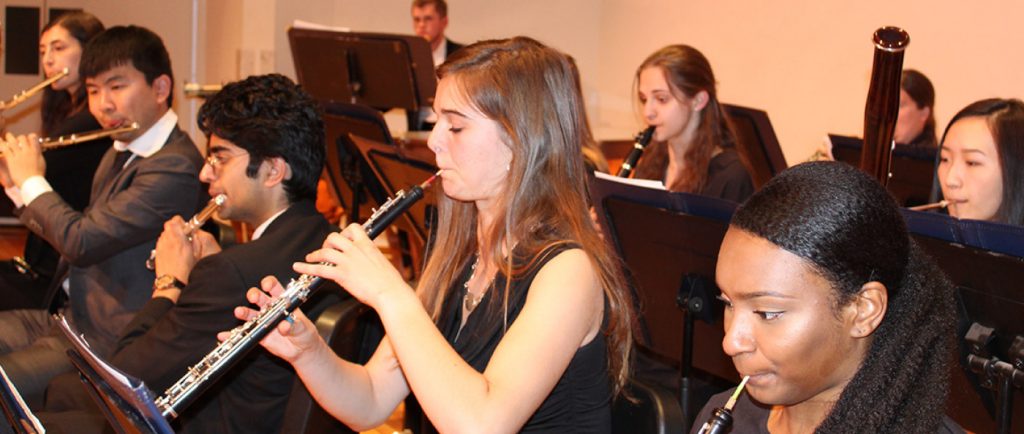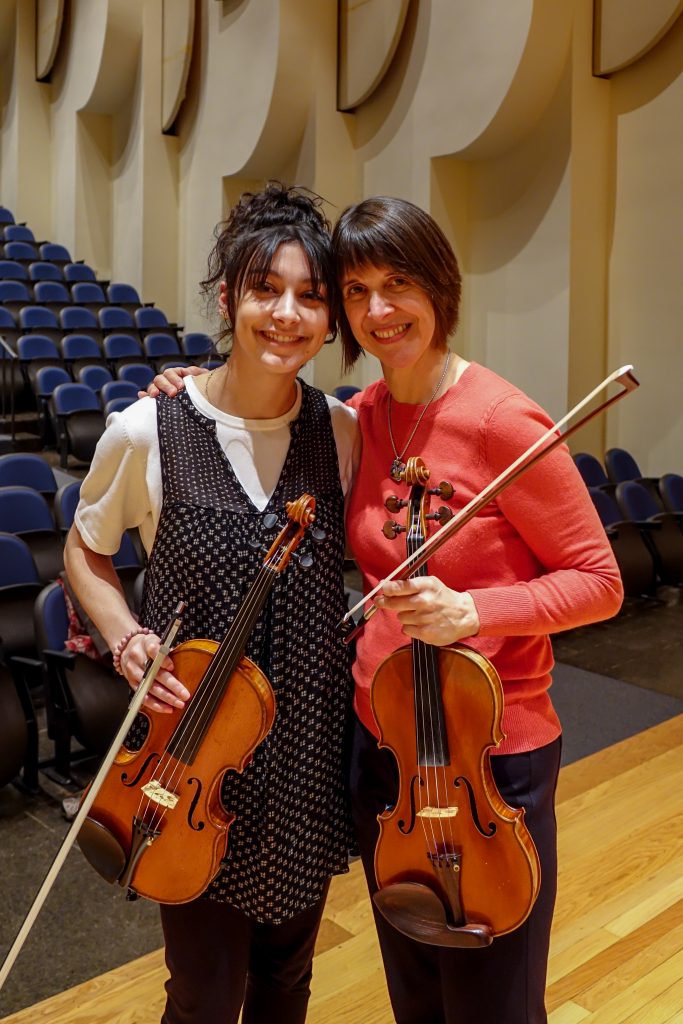Programs & Courses
The Music Major and Minor
Music major and minor opportunities exist for all WFU students no matter their musical background or experiences. Our music minor does not require an audition and offers students the flexibility to explore an array of performance and/or liberal arts music courses. Music majors expand on that rich coursework and either select a liberal arts concentration (no audition required), for which they complete a mentored senior project on a topic of their choice, or they audition for the performance concentration in their second year and present a senior recital. Most music majors successfully double major in areas as diverse as philosophy, political science, or engineering. For specific major and minor course requirements and offerings, please see the Undergraduate Bulletin:

Courses
The Department of Music offers everything from introductory courses for students with little or no musical background, to advanced specialized courses for the music major, as well as a variety of musical ensembles and performance opportunities open to all students (not just music majors and minors).
A full course listing can be found in the Bulletin:
Current semester info about divisional courses and elective courses:
- for ALL students here: Fall 2025 coming soon
SPRING 2025 - for Music Majors/Minors: Fall 2025 coming soon

Individual Instruction
The Department of Music offers individual instruction to Wake Forest students in voice, piano, guitar, and all orchestral and jazz instruments. Students can receive course credit for weekly lessons of 30 minutes (MSC181) or 60 minutes (MSC182, and music major courses 282, 382 and 383).
Interested students can stop by the Department of Music office (M309, Scales Fine Arts Center) or contact the appropriate instructor listed below for more information. Lessons are available to students of all levels, though you must first get approval from your specific instructor via a Workday “Override request” before you can register. More info on the override request process here: Override Request info – PDF
First-time registrants for voice, guitar, and piano lessons will additionally need to interview or audition (depending on level of experience) at the start of each semester; see Current Ensemble/Lesson Registration or contact Drs. Larry Weng (piano), Bryon Grohman (voice) or Marco Sartor (guitar) for more info.
Like many liberal arts universities, Wake Forest assesses an additional individual instruction fee. Current rates are $350 per semester for 30 minute weekly lessons (MSC181) and $700 per semester for hour-long weekly lessons (MSC182 and music major courses 282, 382, and 383), and fees are billed to a student’s account by Financial Services. Need-based scholarships are available; please see the Applied Lesson Fee Scholarship Application.
If you are a beginning student in voice, guitar, or piano, you also have the option to register for class instruction in those areas (MSC161-164), for which there is no additional fee.
Voice and Keyboard
- Bryon Grohman, Associate Professor of Music
Voice - Caryn Greco, Assistant Professor of Music
Voice - Elizabeth Pacheco Rose, adjunct faculty
Voice - Kristin Schwecke, adjunct faculty
Voice - Larry Weng, Assistant Professor of Music
Piano - Joanne Inkman, Teaching Professor
Piano and class piano - Mathilde Handelsman, Visiting Assistant Professor
Piano - Mary Ann Bills, adjunct faculty
Piano - Yong Im Lee Federle, adjunct faculty
Piano - Susan Bates, adjunct faculty
Organ and harpsichord - Matt Reid, adjunct faculty
Jazz piano - Anthony Tang, adjunct faculty
Carillon
Strings
- Jacqui Carrasco, Professor of Music, Chair
Violin and viola - Marco Sartor, Associate Teaching Professor
Guitar and jazz guitar - Evan Richey, adjunct faculty
Cello - Edward Cho, adjunct faculty
Cello - Court Wynter, adjunct faculty
Bass - Helen Rifas, adjunct faculty
Harp - Katherine Wiley, adjunct faculty
Violin and viola - Rachael Keplin, adjunct faculty
Violin and viola
Winds, Brass, and Percussion
- Kathryn Levy, Professor of the Practice
Flute - Oskar Espina Ruiz, adjunct faculty
Clarinet - Taiki Azuma, adjunct faculty
Saxophone and clarinet - Anna Lampidis, adjunct faculty
Oboe - Mark Hekman, adjunct faculty
Bassoon - Judith Saxton
Trumpet - Robert Campbell, adjunct faculty
French horn - James Lane
Trombone - Brent Harvey, adjunct faculty
Tuba and euphonium - John Beck, adjunct faculty
Percussion (Spring 2025 only) - McKayla Phillips
Percussion - Tim Heath, Director of Bands and Associate Teaching Professor
Percussion

